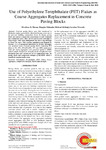Use of Polyethylene Terephthalate (PET) Flakes as Coarse Aggregates Replacement in Concrete Paving Blocks
| dc.contributor.author | Musau, Mwalimu K. | |
| dc.contributor.author | Shitanda, Douglas | |
| dc.contributor.author | Githinji, Michael | |
| dc.contributor.author | Mwende, Caroline | |
| dc.date.accessioned | 2020-12-17T07:28:35Z | |
| dc.date.available | 2020-12-17T07:28:35Z | |
| dc.date.issued | 2020-07 | |
| dc.identifier.issn | 2319-6386 | |
| dc.identifier.uri | http://ir.mksu.ac.ke/handle/123456780/7681 | |
| dc.description.abstract | Concrete paving blocks were first introduced in Holland to replace paver bricks which had become scarce due to the post-war building construction boom. In Kenya, paving blocks are used in construction of pavements in both residential and commercial areas. They can be used in areas with light or heavy traffic. Solid waste management has been a big challenge in Kenya for years. With growing population and demand for housing, it is of paramount importance to develop alternative uses of plastic waste. Concrete paving blocks containing PET flakes at 5%, 10%, 15%,25%,50%, 75% and 100% replacement ratios for coarse aggregates were prepared against a 30MPa control sample. Compressive strength, tensile strength and water absorption tests were carried out. at 5% replacement ratio, the paving blocks had compressive strength of 44.18MPa which is suitable for medium traffic areas. | |
| dc.language.iso | en_US | en_US |
| dc.publisher | Lattice Science Publication | en_US |
| dc.subject | Polyethylene Terephthalate (PET) Flakes | en_US |
| dc.subject | Coarse Aggregates | en_US |
| dc.subject | Compressive Strength | en_US |
| dc.subject | Tensile Split Strength | en_US |
| dc.title | Use of Polyethylene Terephthalate (PET) Flakes as Coarse Aggregates Replacement in Concrete Paving Blocks | en_US |
| dc.type | Article | en_US |
Files in this item
This item appears in the following Collection(s)
-
School of Engineering and Technology [116]
Scholarly Articles by Faculty & Students in School of Engineering and Technology

